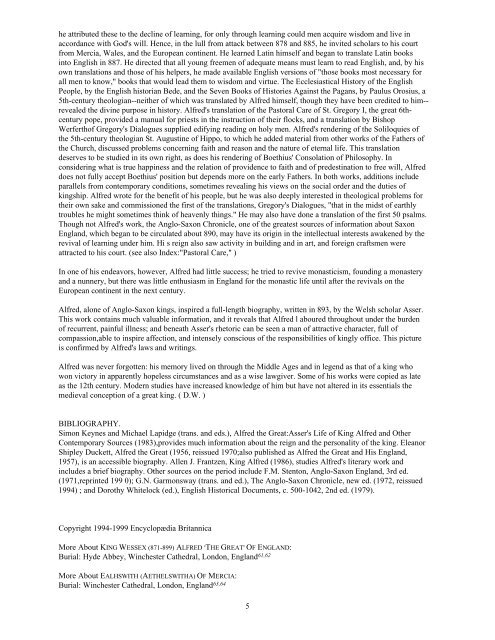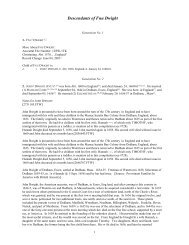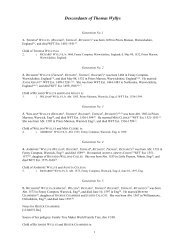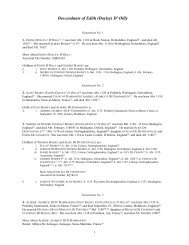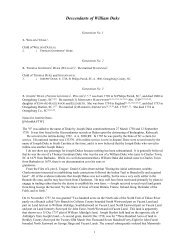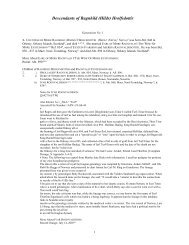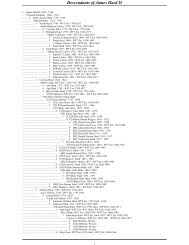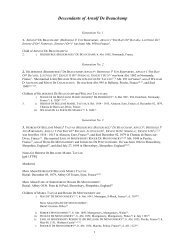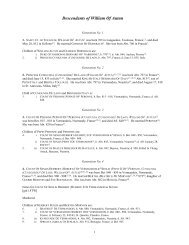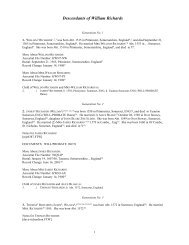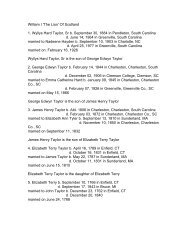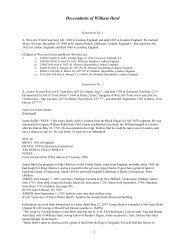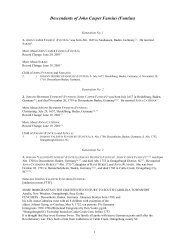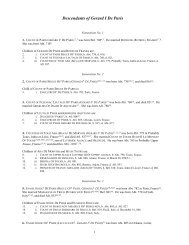Aethelwulf Of England.pdf - GBLCreations
Aethelwulf Of England.pdf - GBLCreations
Aethelwulf Of England.pdf - GBLCreations
Create successful ePaper yourself
Turn your PDF publications into a flip-book with our unique Google optimized e-Paper software.
he attributed these to the decline of learning, for only through learning could men acquire wisdom and live in<br />
accordance with God's will. Hence, in the lull from attack between 878 and 885, he invited scholars to his court<br />
from Mercia, Wales, and the European continent. He learned Latin himself and began to translate Latin books<br />
into English in 887. He directed that all young freemen of adequate means must learn to read English, and, by his<br />
own translations and those of his helpers, he made available English versions of "those books most necessary for<br />
all men to know," books that would lead them to wisdom and virtue. The Ecclesiastical History of the English<br />
People, by the English historian Bede, and the Seven Books of Histories Against the Pagans, by Paulus Orosius, a<br />
5th-century theologian--neither of which was translated by Alfred himself, though they have been credited to him-revealed<br />
the divine purpose in history. Alfred's translation of the Pastoral Care of St. Gregory I, the great 6thcentury<br />
pope, provided a manual for priests in the instruction of their flocks, and a translation by Bishop<br />
Werferthof Gregory's Dialogues supplied edifying reading on holy men. Alfred's rendering of the Soliloquies of<br />
the 5th-century theologian St. Augustine of Hippo, to which he added material from other works of the Fathers of<br />
the Church, discussed problems concerning faith and reason and the nature of eternal life. This translation<br />
deserves to be studied in its own right, as does his rendering of Boethius' Consolation of Philosophy. In<br />
considering what is true happiness and the relation of providence to faith and of predestination to free will, Alfred<br />
does not fully accept Boethius' position but depends more on the early Fathers. In both works, additions include<br />
parallels from contemporary conditions, sometimes revealing his views on the social order and the duties of<br />
kingship. Alfred wrote for the benefit of his people, but he was also deeply interested in theological problems for<br />
their own sake and commissioned the first of the translations, Gregory's Dialogues, "that in the midst of earthly<br />
troubles he might sometimes think of heavenly things." He may also have done a translation of the first 50 psalms.<br />
Though not Alfred's work, the Anglo-Saxon Chronicle, one of the greatest sources of information about Saxon<br />
<strong>England</strong>, which began to be circulated about 890, may have its origin in the intellectual interests awakened by the<br />
revival of learning under him. Hi s reign also saw activity in building and in art, and foreign craftsmen were<br />
attracted to his court. (see also Index:"Pastoral Care," )<br />
In one of his endeavors, however, Alfred had little success; he tried to revive monasticism, founding a monastery<br />
and a nunnery, but there was little enthusiasm in <strong>England</strong> for the monastic life until after the revivals on the<br />
European continent in the next century.<br />
Alfred, alone of Anglo-Saxon kings, inspired a full-length biography, written in 893, by the Welsh scholar Asser.<br />
This work contains much valuable information, and it reveals that Alfred l aboured throughout under the burden<br />
of recurrent, painful illness; and beneath Asser's rhetoric can be seen a man of attractive character, full of<br />
compassion,able to inspire affection, and intensely conscious of the responsibilities of kingly office. This picture<br />
is confirmed by Alfred's laws and writings.<br />
Alfred was never forgotten: his memory lived on through the Middle Ages and in legend as that of a king who<br />
won victory in apparently hopeless circumstances and as a wise lawgiver. Some of his works were copied as late<br />
as the 12th century. Modern studies have increased knowledge of him but have not altered in its essentials the<br />
medieval conception of a great king. ( D.W. )<br />
BIBLIOGRAPHY.<br />
Simon Keynes and Michael Lapidge (trans. and eds.), Alfred the Great:Asser's Life of King Alfred and Other<br />
Contemporary Sources (1983),provides much information about the reign and the personality of the king. Eleanor<br />
Shipley Duckett, Alfred the Great (1956, reissued 1970;also published as Alfred the Great and His <strong>England</strong>,<br />
1957), is an accessible biography. Allen J. Frantzen, King Alfred (1986), studies Alfred's literary work and<br />
includes a brief biography. Other sources on the period include F.M. Stenton, Anglo-Saxon <strong>England</strong>, 3rd ed.<br />
(1971,reprinted 199 0); G.N. Garmonsway (trans. and ed.), The Anglo-Saxon Chronicle, new ed. (1972, reissued<br />
1994) ; and Dorothy Whitelock (ed.), English Historical Documents, c. 500-1042, 2nd ed. (1979).<br />
Copyright 1994-1999 Encyclopædia Britannica<br />
More About KING WESSEX (871-899) ALFRED 'THE GREAT' OF ENGLAND:<br />
Burial: Hyde Abbey, Winchester Cathedral, London, <strong>England</strong> 61,62<br />
More About EALHSWITH (AETHELSWITHA) OF MERCIA:<br />
Burial: Winchester Cathedral, London, <strong>England</strong> 63,64<br />
5


